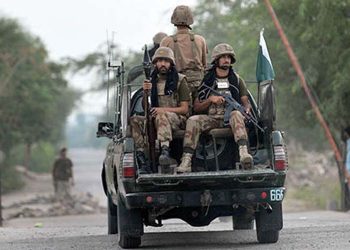Shall we really hope some miracles happen and resolves the Kashmir conflict and improves the regional peace after Pakistan-India have announced reaching an agreement to recommit themselves to the 2003 ceasefire arrangement at the Line of Control (LOC)? Shall they actually abide by their commitment to what they have agreed to, taking all measures to address ‘core issues’ that could undermine peace and stability? The two questions need thorough and objective analysis in the historic perspective and future aspirations of the two countries before we enthusiastically applaud the surprising announcement jointly made by the Directors General Military Operations (DGMOs) of both sides.
We believe that the DGMOs have had a ‘very frank and friendly’ hotline meeting but the people of both sides are more interested to know the future of the present ceasefire that was actually reassured after 16 years of cross-border violations. The actual ceasefire agreement was made in 2003 but never implemented in letter and spirit. India has been violating all terms and conditions of the agreement as usual on the border and in Indian Illegally Occupied Jammu and Kashmir (IIOJK) that is under severe hostility since August 5, 2019. No respite is seen there so far. Not even expected after the recent ceasefire agreement.
One of the key parts of the statement that did not get much attention was the one related to commitment to addressing core issues bedeviling the ties. The statement noted, “In the interest of achieving mutually beneficial and sustainable peace, the two DGMOs agreed to address each other’s core issues and concerns which have the propensity to disturb peace and lead to violence.”
This is indeed significant efforts by the militaries of both sides and we all shall appreciate India for agreeing to the ceasefire after breaching the 2003 agreement in 2014. We must appreciate the DGMOs of both sides, Maj Gen Nauman Zakaria and Lt Gen Paramjit Sangha, for having “free and frank conversation in a cordial atmosphere” that culminated in a step forward to peace for the people on both sides of the border.
The question to ponder is that the recent recommitment to a ceasefire by India is as simple as being projected. Certainly not. Then, what could be the future gains? Surely, we all shall join the folks trying to find out the hidden interests. The new US government is committed to continuing to curtail China’s economic growth by any means. India, being the US proxy in the region against China, is trying to focus on engaging China on different fronts including fiddling on the borders. Ceasefire on the LoC will help India to focus on the fronts against China.
Secondly, it could be an attempt to get the world’s attention diverted from what is actually happening inside the Indian Occupied Jammu and Kashmir. Despite all pressures, India didn’t allow UN observers, human rights watchdogs, and the international media to visit the occupied territory. As a next step after the ceasefire, India shall allow the international observers to independently visit the occupied Jammu and Kashmir. Thirdly, all the detained and arrested Kashmiri leaders shall be freed immediately and be given space to speak out about the situation in the occupied Kashmir. Otherwise, the ceasefire will merely be an eyewash.
The defense experts have already termed it breathing space for India for their strategic gain and to divert the world’s attention from the actual situation in the Illegally Indian Occupied Jammu and Kashmir (IIOJ&K). The ceasefire agreement between India-Pakistan was inked in 2003 that was unilaterally revoked by India in 2014 to intensify atrocities in IIOJK. Now, Pakistan shall ask India to do more in real terms to improve the peace and human rights situation in the IoK and to stop unwarranted propaganda against Pakistan on the global forums.
Senator Mushahid Hussain Syed, the chairman Senate Standing Committee on Foreign Affairs, has rightly termed the ceasefire as the first step towards peace and harmony between both countries. He is one of the believers that Pakistan shall ask the Indian government to show their seriousness by restoring the IoK’s position as it was on August 4, 2019. All the Kashmiri leaders shall be released from the illegal detention and the occupation of their lands shall be reversed.
India has realised that its Pakistan bashing strategy has failed miserably. All the nations globally have seen the real Indian face after all the fake makeup initiatives that have surfaced recently. For India’s face-saving, Prime Minister Modi shall come forward to announce a comprehensive strategy to resolve all the longstanding issues among the countries in the region. The SAARC summit is pending for years now because of the Indian hegemonic behaviour. It should be convened sooner than later to engage all the countries in peace-building efforts and to launch joint efforts against the challenges of poverty, economic recession, trade and climate change.
We all shall pray that the ceasefire shall last for long though it is feared that India could not stop itself for long violating the LoC. Pakistan needs to be vigilant about the post-ceasefire movement on the LOC as it could be a strategic move to camouflage atrocities in the IoK. The ceasefire means nothing if the situation in the held Kashmir doesn’t improve and bilateral relations do not come to a normal.
Former ISI chief Lt. General (Retd) Asad Durrani believes that we shall not expect any paradigm shift in the Indian mindset. The Hindutva policy would continue and there will be no improvement in the IoK region. Terming it a respite for India, the former ISI chief said it would turn to be a temporary ceasefire for some strategic gains that we have no idea about.
Pakistan and the organizations working on the Kashmir issue shall keep on highlighting the atrocities being committed by India and keep on asking India to do more. Both countries are multi-ethnic nations and need to work out a way for harmony and a peaceful neighbourhood through tolerance for each other. The regional peace and prosperity depend on the peaceful living of both countries. The civil society on both sides shall keep on raising their voices against the aggressive designs of the Indian and Pakistan governments against each other.

























